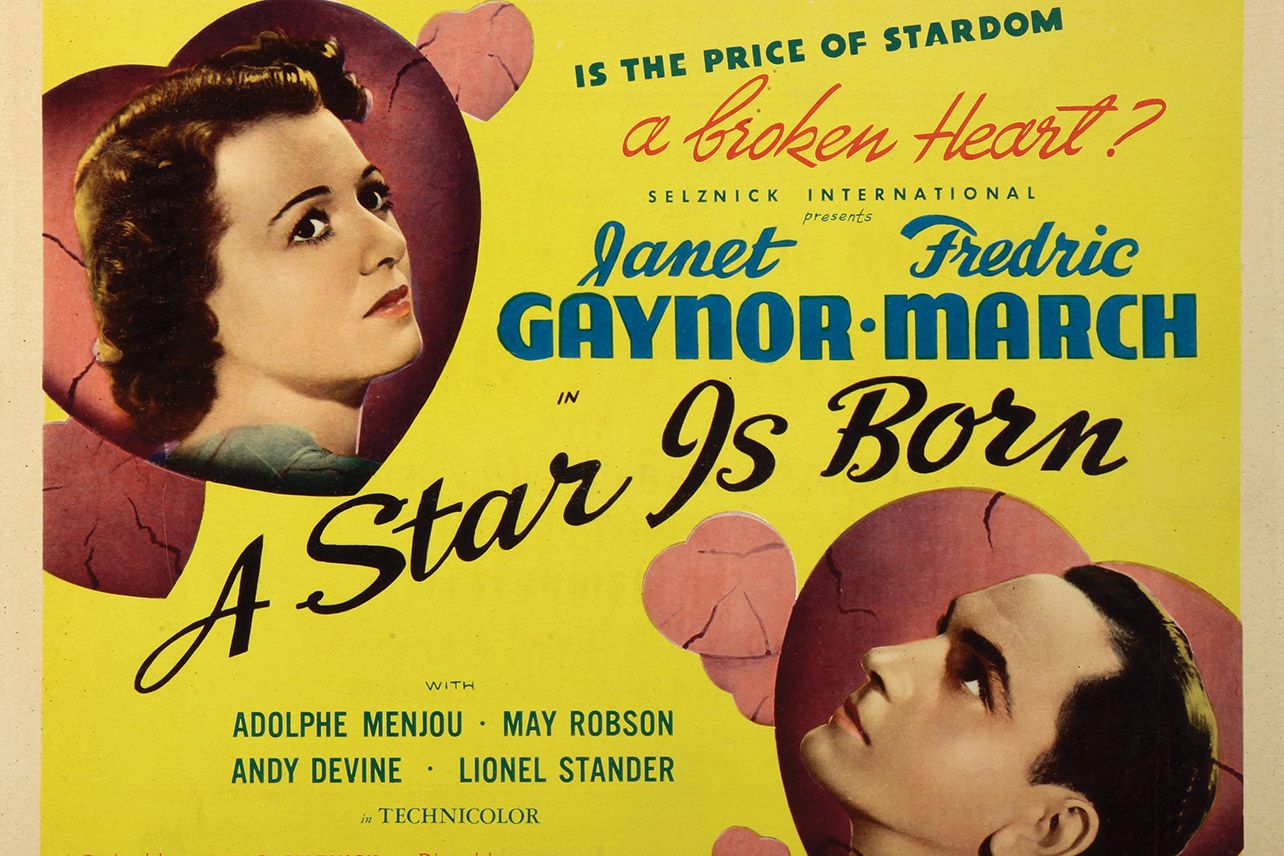
A Star Is Born, the devastating romantic drama released in 1937, explores Hollywood stardom through the rise and fall of Hollywood stars.
If you’ve seen any of the four feature films, you already know the basic gist of the plot. I’ve only seen two of them. But in this film, Esther Blodgett (Janet Gaynor) is an aspiring actress and moves from Kansas to Hollywood. By chance, she meets Norman Maine (Fredric March), a veteran film star on the decline. Norman is also an alcoholic. Norman and Esther, now known as Vicki Lester as is a Hollywood custom, fall in love and get married. Maine is an alcoholic and eventually drowns to death. Vicki would have done anything–including quitting–if it meant Norman’s career continuing. There are many familiar Hollywood sights seen in the film. Among them are Grauman’s Chinese Theatre and the Hollywood Bowl. You cannot NOT go to the Chinese Theatre upon arriving in Hollywood!
Remember the scene in the 2018 film when Bradley Cooper ruins Lady Gaga’s Grammy award speech? It’s a scene that takes its roots in the original film. Only this time, it’s Norman Maine ruining Vicki Lester’s Oscar acceptance speech. Wellman directed Wings but hadn’t been nominated as Best Director nor was he invited to attend the ceremony.
While William A. Wellman directed the film, producer David Selznick had offered the gig to Georgr Cukor. Cukor declined but he would later direct the 1954 remake starring Judy Garland. Anyway, the film had been a dream project for Wellman. When he originally pitched the idea upon signing with Selznick, it was called It Happened In Hollywood. Ultimately, the name would change but the basic gist was there from the beginning. Wellman wanted to make a film that revealed the inner workings of Hollywood while exploring both the rise and fall of movie stars. Selznick produced What Price Hollywood a few years earlier so it makes sense on a level to reject the idea. However, Wellman lobbies Selznick’s then-wife, Irene, and the producer would later change his mind.
Wellman and Robert Carson wrote the script for A Star Is Born together. To nobody’s surprise, a number of writers came and went. Dorothy Parker and Alan Campbell are the only other writers among them to receive credit. This really speaks to just how many writers get hired on a film during the Golden Age. Selznick wanted Merle Oberon to star as Esther Blodgett but Wellman couldn’t see it an fought for Janet Gaynor. Wellman makes sure to fill out the cast with a number of has-beens to give the film a sense of authenticity.
Wellman drew from his own life and friends in telling this story. There’s a bit of both John Barrymore and John Gilbert in Norman Maine. Both suffered from alcoholism. Wellman’s ex-wife, Helene Chatwick, was also a faded star. However, it’s silent screen star John Bowers who is the closest in real life to that of Norman Maine. Once sound pictures arrived, Bowers’s career started to fade and his alcoholism only got worse. When one begins to look into the biography of Bowers, you can really see how he IS Norman Maine. He married Marguerite De La Motte in 1923 and the two shared lead billing in their 12 pictures together from 1923-27. Come 1932, they were separated and Bowers wasn’t getting any offers. Bowers rent a boat in November 1936 and his body was found the next day. With Maine, he would swim instead of sail.
Visually speaking, this is the first contemporary feature shot with three-strip technicolor. Despite the pioneering of color photography, it didn’t ruin the film in any form. Other early attempts in other films might have been distracting to audiences. W. Howard Greene received a special Oscar for his color photography achievements.
A Star Is Born is no doubt a powerful story–after all, Hollywood wouldn’t keep remaking the film if there wasn’t something there. The Life of Emile Zola may have won Best Picture but A Star Is Born remains popular to this day.
DIRECTOR: William A. Wellman
SCREENWRITERS: William A. Wellman, Robert Carson, Dorothy Parker, and Alan Campbell
CAST: Janet Gaynor, Fredric March, Adolphe Menjou, May Robson, Andy Devine, Lionel Stander



